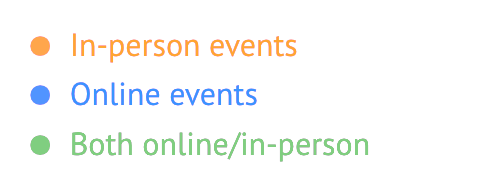Working with Clients with IDD and Mental Health Concerns: An Introduction | IDD Track, Mental Health Institute
Event Details
NOTE: This event is specifically for Washington State attendees who are part of the behavioral health workforce. This session is part of the Intellectual and Developmental Disabilities (IDD) track of the
Event Details
NOTE: This event is specifically for Washington State attendees who are part of the behavioral health workforce.
This session is part of the Intellectual and Developmental Disabilities (IDD) track of the Mental Health Institute.
ABOUT THIS EVENT
Working with Clients with IDD and Mental Health Concerns will provide introductory information related to the cooccurrence of Intellectual & Developmental Disability and mental health issues that often occur in individuals who are neurodiverse (e.g., autism, IDD). Lived perspectives from clients and providers will be presented along with foundational knowledge about working with this population and a preview of future weekly sessions.
Contact hours will be available for participants who attend the entire session. The University of Washington is an approved provider of continuing education for DOH licensed social workers, licensed mental health counselors, licensed marriage and family therapists, psychologists, chemical dependency professionals, nurses and physicians under the provisions of: WAC 246-809-610, WAC 246-809-620,WAC 246-811-200, WAC 246-840-210, WAC 246-919-460 and WAC 246-924-240.
Session is 9a-4p PT
See more in the Intellectual and Developmental Disabilities (IDD) Track HERE
LEARN MORE ABOUT THE MENTAL HEALTH INSTITUTE HERE
Time
Organizer
Northwest MHTTC - Northwest Mental Health Technology Center
Who We Are / What We Do
This website brings together practical and current tools, strategies, and information designed to help physicians and other health care providers in Washington State care for children and youth with special health care needs and their families.Time
December 5, 2025 8:30 am - 4:30 pm(GMT-08:00)Location
ZOOM
Other Events Link to full-month event calendar.
Link to full-month event calendar.Who We Are / What We Do
This website brings together practical and current tools, strategies, and information designed to help physicians and other health care providers in Washington State care for children and youth with special health care needs and their families.Time
December 5, 2025 8:30 am - 4:30 pm(GMT-08:00)Location
ZOOM
Other Events Link to full-month event calendar.
Link to full-month event calendar.
- Box 357920
Seattle, WA 98195-7920 - 206.685.1279
- info@medicalhome.org



